-
 Bitcoin
Bitcoin $85,370.4388
0.95% -
 Ethereum
Ethereum $1,603.2654
1.18% -
 Tether USDt
Tether USDt $0.9999
0.00% -
 XRP
XRP $2.0887
0.65% -
 BNB
BNB $592.6740
0.55% -
 Solana
Solana $139.0685
3.22% -
 USDC
USDC $0.9999
0.01% -
 Dogecoin
Dogecoin $0.1587
2.19% -
 TRON
TRON $0.2422
-0.94% -
 Cardano
Cardano $0.6309
2.52% -
 UNUS SED LEO
UNUS SED LEO $9.3607
2.21% -
 Chainlink
Chainlink $12.8762
1.78% -
 Avalanche
Avalanche $19.5707
2.06% -
 Stellar
Stellar $0.2473
1.98% -
 Toncoin
Toncoin $2.9915
-0.52% -
 Shiba Inu
Shiba Inu $0.0...01219
1.76% -
 Hedera
Hedera $0.1667
0.74% -
 Sui
Sui $2.1493
1.18% -
 Bitcoin Cash
Bitcoin Cash $339.1301
2.84% -
 Hyperliquid
Hyperliquid $18.0894
7.28% -
 Polkadot
Polkadot $3.7238
1.05% -
 Litecoin
Litecoin $76.3383
0.96% -
 Dai
Dai $0.9999
0.00% -
 Bitget Token
Bitget Token $4.4698
2.64% -
 Ethena USDe
Ethena USDe $0.9992
0.01% -
 Pi
Pi $0.6470
5.49% -
 Monero
Monero $214.9085
-0.96% -
 Uniswap
Uniswap $5.2859
1.55% -
 Pepe
Pepe $0.0...07295
1.16% -
 OKB
OKB $50.6476
0.72%
What is the difference between HTX's perpetual contract and delivery contract?
HTX offers perpetual and delivery contracts for crypto trading; perpetuals have no expiration, while deliveries settle at a set date, impacting trading strategies.
Apr 09, 2025 at 12:35 pm

The world of cryptocurrency trading offers a variety of financial instruments, and among them, futures contracts are particularly popular. HTX, a leading cryptocurrency exchange, provides two types of futures contracts: perpetual contracts and delivery contracts. Understanding the differences between these two can significantly impact your trading strategy and outcomes. In this article, we will delve into the specifics of HTX's perpetual contract and delivery contract, highlighting their key features, mechanics, and how they cater to different trading needs.
What is a Perpetual Contract?
A perpetual contract, also known as a perpetual swap, is a type of futures contract that does not have an expiration date. This means that traders can hold their positions indefinitely without the need to roll over to a new contract. Perpetual contracts are designed to closely track the underlying asset's spot price, making them a popular choice for traders looking to gain exposure to cryptocurrencies without owning the actual asset.
Key Features of Perpetual Contracts:
- No Expiration Date: Unlike traditional futures contracts, perpetual contracts do not expire, allowing traders to maintain their positions for as long as they wish.
- Funding Rate Mechanism: To ensure that the perpetual contract's price stays aligned with the spot price, a funding rate is periodically exchanged between long and short positions. If the funding rate is positive, long positions pay short positions, and vice versa if the rate is negative.
- Leverage: Perpetual contracts often allow for high leverage, enabling traders to amplify their exposure to the market with a smaller initial investment.
How to Trade Perpetual Contracts on HTX:
- Open the HTX Platform: Navigate to the HTX website and log into your account.
- Access the Futures Trading Section: Click on the "Futures" tab to enter the futures trading interface.
- Select a Perpetual Contract: Choose the cryptocurrency pair you wish to trade, ensuring it is labeled as a perpetual contract.
- Set Your Position: Decide whether you want to go long or short, and set your leverage and position size.
- Place Your Order: Use the order book to place your trade, choosing between market, limit, or other order types as needed.
- Monitor and Manage Your Position: Keep an eye on the funding rate and adjust your position as necessary to manage risk and potential profits.
What is a Delivery Contract?
A delivery contract, also known as a traditional futures contract, is a financial derivative that obligates the buyer to purchase, and the seller to sell, a specific asset at a predetermined price on a specified future date. In the context of HTX, delivery contracts involve the actual delivery of the underlying cryptocurrency at the contract's expiration.
Key Features of Delivery Contracts:
- Expiration Date: Delivery contracts have a set expiration date, at which point the contract must be settled by either physical delivery of the asset or cash settlement.
- Settlement: At expiration, the contract is settled based on the spot price of the underlying asset. If the contract is in-the-money, the buyer receives the asset or its cash equivalent, and the seller delivers the asset or pays the cash equivalent.
- Leverage: Similar to perpetual contracts, delivery contracts on HTX may offer leverage, allowing traders to control larger positions with less capital.
How to Trade Delivery Contracts on HTX:
- Open the HTX Platform: Log into your HTX account.
- Access the Futures Trading Section: Navigate to the "Futures" tab.
- Select a Delivery Contract: Choose the cryptocurrency pair you wish to trade, ensuring it is labeled as a delivery contract with a specific expiration date.
- Set Your Position: Decide whether you want to go long or short, and set your leverage and position size.
- Place Your Order: Use the order book to place your trade, selecting the appropriate order type.
- Monitor and Manage Your Position: Keep track of the contract's expiration date and plan your strategy accordingly, whether to close the position before expiration or prepare for settlement.
Key Differences Between Perpetual and Delivery Contracts
Expiration and Settlement:
- Perpetual Contracts: These contracts do not expire, and there is no physical delivery of the asset. Instead, they use a funding rate mechanism to align the contract price with the spot price.
- Delivery Contracts: These contracts have a fixed expiration date, and at expiration, the contract is settled either by physical delivery of the asset or cash settlement.
Trading Strategy and Flexibility:
- Perpetual Contracts: The lack of an expiration date provides greater flexibility for traders, allowing them to hold positions indefinitely. This is particularly useful for traders who want to maintain exposure to the market without the need to roll over contracts.
- Delivery Contracts: Traders must be mindful of the expiration date and plan their strategy around it. This can be advantageous for those who want to lock in a price for a specific future date or engage in arbitrage opportunities.
Risk Management:
- Perpetual Contracts: The funding rate mechanism introduces an additional layer of risk management, as traders must consider the impact of funding rates on their positions. High funding rates can erode profits for long positions and vice versa for short positions.
- Delivery Contracts: The risk is more straightforward, as it revolves around the price of the asset at expiration. Traders must manage their positions to ensure they can meet the obligations of the contract at expiration.
Choosing Between Perpetual and Delivery Contracts
When deciding between perpetual and delivery contracts, traders should consider their trading goals, risk tolerance, and market outlook.
For Long-Term Exposure:
- Perpetual Contracts: If you are looking to gain long-term exposure to a cryptocurrency without the hassle of rolling over contracts, perpetual contracts are the better choice. The absence of an expiration date allows you to maintain your position as long as you see fit.
For Specific Date Strategies:
- Delivery Contracts: If your trading strategy involves locking in a price for a specific future date, delivery contracts are more suitable. They allow you to plan your trades around known expiration dates and can be used for hedging or arbitrage purposes.
For Leverage and Flexibility:
- Perpetual Contracts: If you prefer high leverage and the flexibility to adjust your positions without worrying about expiration, perpetual contracts offer these advantages. The funding rate mechanism, while adding complexity, also provides an additional tool for managing your trades.
For Simplicity and Direct Settlement:
- Delivery Contracts: If you prefer a more straightforward approach with a clear settlement process, delivery contracts might be more appealing. The fixed expiration date and direct settlement can simplify your trading strategy and risk management.
Practical Examples of Using Perpetual and Delivery Contracts
Example of Using Perpetual Contracts:
Imagine you believe that Bitcoin's price will increase over the next few months. You decide to use a perpetual contract to gain exposure to Bitcoin without owning the actual asset.
- Open a Long Position: You open a long position on a Bitcoin perpetual contract with 10x leverage.
- Monitor the Funding Rate: You keep an eye on the funding rate, which is currently positive, meaning you will need to pay funding to short positions.
- Adjust Your Position: As the funding rate increases, you decide to reduce your leverage to manage the cost of funding.
- Close Your Position: After a few months, Bitcoin's price has risen significantly, and you decide to close your position to realize your profits.
Example of Using Delivery Contracts:
Suppose you want to hedge against a potential drop in Ethereum's price over the next three months. You decide to use a delivery contract to lock in a price for that period.
- Open a Short Position: You open a short position on an Ethereum delivery contract expiring in three months.
- Monitor the Market: You keep track of Ethereum's price movements and the approaching expiration date.
- Close or Settle Your Position: As the expiration date nears, you decide whether to close your position early or let it expire. If Ethereum's price has dropped, you will profit from the short position at expiration.
Frequently Asked Questions
Q1: Can I switch between a perpetual contract and a delivery contract on HTX?
No, you cannot directly switch between a perpetual contract and a delivery contract on HTX. If you want to change your position from one type of contract to another, you will need to close your current position and open a new one in the desired contract type.
Q2: How does HTX handle the settlement of delivery contracts?
HTX handles the settlement of delivery contracts based on the terms of the contract. If the contract specifies physical delivery, the underlying cryptocurrency will be transferred to the buyer's account at expiration. If it is a cash-settled contract, the difference between the contract price and the spot price at expiration will be credited or debited from your account.
Q3: Are there any fees associated with trading perpetual and delivery contracts on HTX?
Yes, HTX charges various fees for trading futures contracts, including trading fees, funding fees for perpetual contracts, and potential settlement fees for delivery contracts. It's important to review HTX's fee schedule to understand the costs associated with your trades.
Q4: Can I use both perpetual and delivery contracts in the same trading strategy?
Yes, you can use both types of contracts in your trading strategy, depending on your goals and market outlook. For example, you might use perpetual contracts for long-term exposure and delivery contracts for specific date strategies or hedging purposes.
Disclaimer:info@kdj.com
The information provided is not trading advice. kdj.com does not assume any responsibility for any investments made based on the information provided in this article. Cryptocurrencies are highly volatile and it is highly recommended that you invest with caution after thorough research!
If you believe that the content used on this website infringes your copyright, please contact us immediately (info@kdj.com) and we will delete it promptly.
- Ethereum (ETH) Has Seen a Dramatic Price Drop in Q1 2025
- 2025-04-19 17:30:13
- Dogecoin (DOGE) Price Drops by 1.32%, but Futures Market Activity Surges
- 2025-04-19 17:30:13
- 'Keep an eye out' for 2p coin with this obvious error worth £1,350
- 2025-04-19 17:25:14
- Bitcoin BTC Price News Today: Bitcoin Is Under Serious Pressure as Global Recession Fears
- 2025-04-19 17:25:13
- Canary Capital Files to List Spot TRX-Holding and Staking Rewards-Generating ETF
- 2025-04-19 17:20:13
- Abstract Chain (spearheading the next generation of Ethereum L-2 networks) experiences surge in network activity
- 2025-04-19 17:20:13
Related knowledge
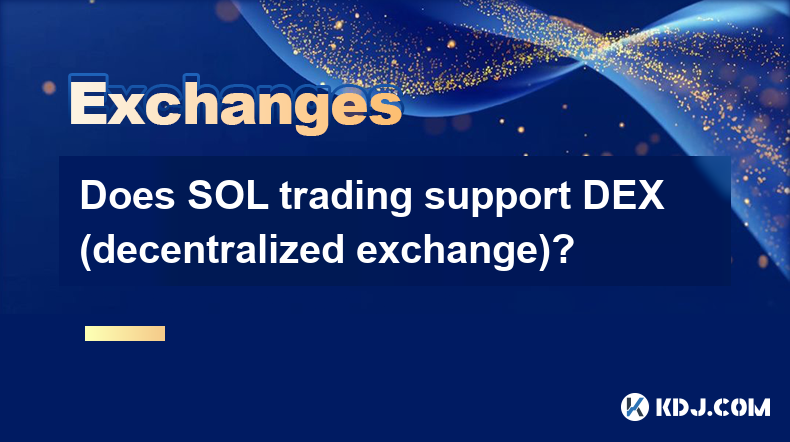
Does SOL trading support DEX (decentralized exchange)?
Apr 19,2025 at 05:21am
Solana (SOL), a high-performance blockchain platform, has gained significant attention in the cryptocurrency community for its fast transaction speeds and low fees. One of the key aspects that traders and investors often inquire about is whether SOL trading supports decentralized exchanges (DEXs). In this article, we will explore this topic in detail, p...
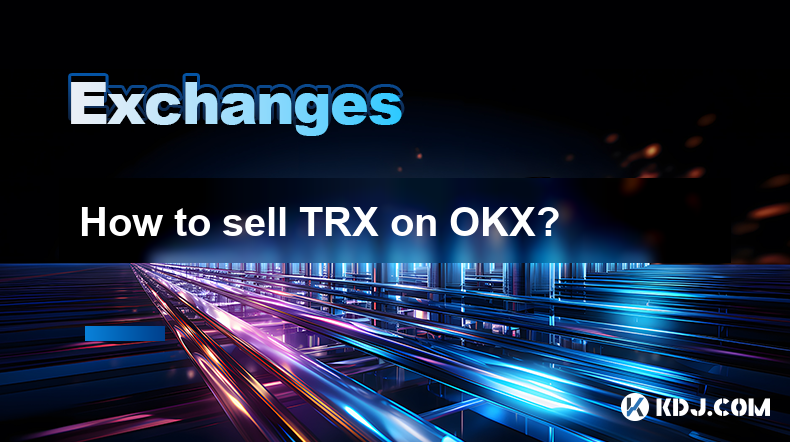
How to sell TRX on OKX?
Apr 18,2025 at 11:07pm
Selling TRX on OKX is a straightforward process that can be completed in a few simple steps. This article will guide you through the entire process, ensuring that you understand each step thoroughly. Whether you are a beginner or an experienced trader, this guide will help you navigate the OKX platform with ease. Preparing to Sell TRX on OKXBefore you c...
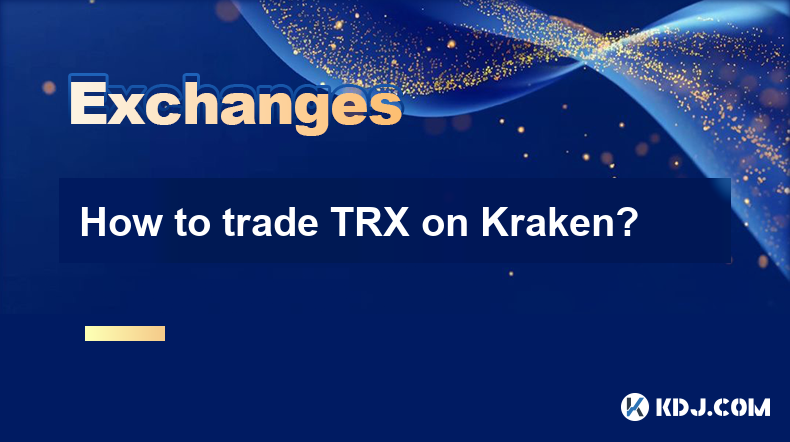
How to trade TRX on Kraken?
Apr 19,2025 at 02:00am
Trading TRX on Kraken involves several steps, from setting up your account to executing your first trade. Here's a detailed guide on how to get started and successfully trade TRX on the Kraken platform. Setting Up Your Kraken AccountBefore you can start trading TRX on Kraken, you need to set up an account. Here's how to do it: Visit the Kraken website a...
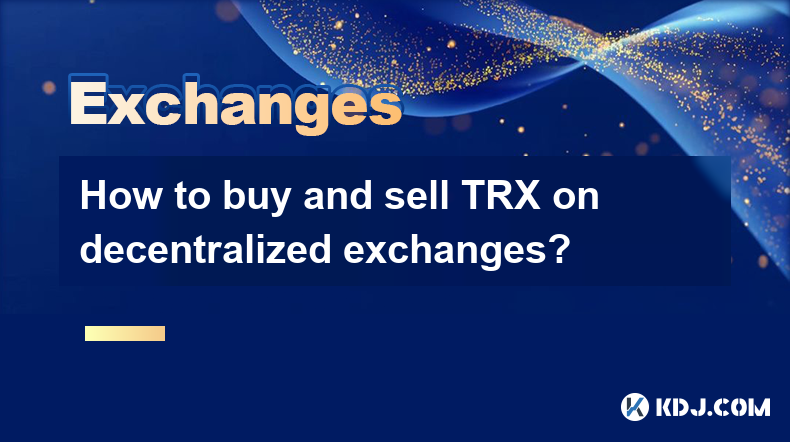
How to buy and sell TRX on decentralized exchanges?
Apr 18,2025 at 08:08pm
Introduction to TRX and Decentralized ExchangesTRX, or Tron, is a popular cryptocurrency that aims to build a decentralized internet and entertainment ecosystem. Decentralized exchanges (DEXs) offer a way to trade cryptocurrencies like TRX without the need for a central authority, providing greater privacy and control over your funds. In this article, w...
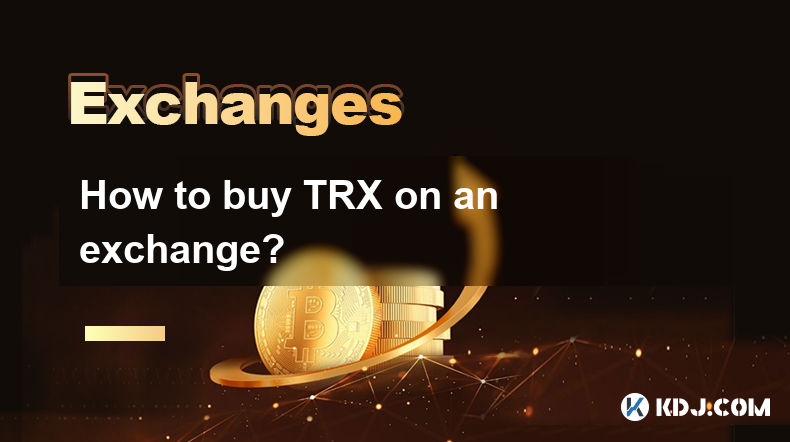
How to buy TRX on an exchange?
Apr 19,2025 at 12:08pm
Buying TRX, the native cryptocurrency of the Tron network, on an exchange is a straightforward process that involves several key steps. This guide will walk you through the process of purchasing TRX, ensuring you understand each step thoroughly. Choosing a Reliable ExchangeBefore you can buy TRX, you need to select a reputable cryptocurrency exchange th...
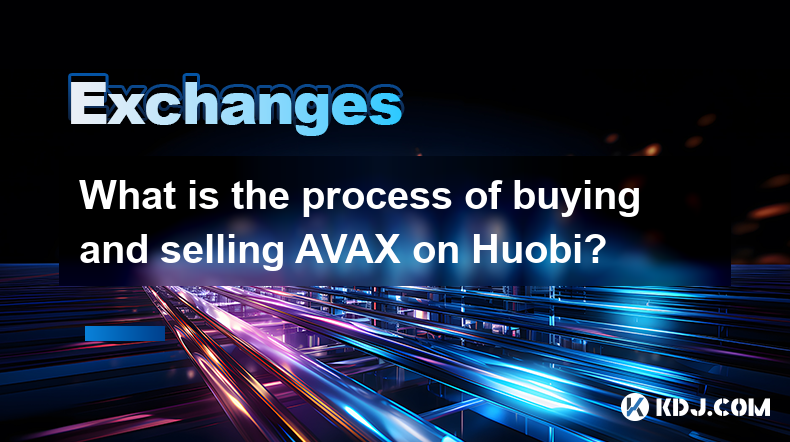
What is the process of buying and selling AVAX on Huobi?
Apr 18,2025 at 07:50pm
Understanding AVAX and Huobi Before diving into the process of buying and selling AVAX on Huobi, it's essential to understand what these terms mean. AVAX is the native cryptocurrency of the Avalanche blockchain, a platform designed for decentralized applications and custom blockchain networks. Huobi, on the other hand, is a leading global cryptocurrency...

Does SOL trading support DEX (decentralized exchange)?
Apr 19,2025 at 05:21am
Solana (SOL), a high-performance blockchain platform, has gained significant attention in the cryptocurrency community for its fast transaction speeds and low fees. One of the key aspects that traders and investors often inquire about is whether SOL trading supports decentralized exchanges (DEXs). In this article, we will explore this topic in detail, p...

How to sell TRX on OKX?
Apr 18,2025 at 11:07pm
Selling TRX on OKX is a straightforward process that can be completed in a few simple steps. This article will guide you through the entire process, ensuring that you understand each step thoroughly. Whether you are a beginner or an experienced trader, this guide will help you navigate the OKX platform with ease. Preparing to Sell TRX on OKXBefore you c...

How to trade TRX on Kraken?
Apr 19,2025 at 02:00am
Trading TRX on Kraken involves several steps, from setting up your account to executing your first trade. Here's a detailed guide on how to get started and successfully trade TRX on the Kraken platform. Setting Up Your Kraken AccountBefore you can start trading TRX on Kraken, you need to set up an account. Here's how to do it: Visit the Kraken website a...

How to buy and sell TRX on decentralized exchanges?
Apr 18,2025 at 08:08pm
Introduction to TRX and Decentralized ExchangesTRX, or Tron, is a popular cryptocurrency that aims to build a decentralized internet and entertainment ecosystem. Decentralized exchanges (DEXs) offer a way to trade cryptocurrencies like TRX without the need for a central authority, providing greater privacy and control over your funds. In this article, w...

How to buy TRX on an exchange?
Apr 19,2025 at 12:08pm
Buying TRX, the native cryptocurrency of the Tron network, on an exchange is a straightforward process that involves several key steps. This guide will walk you through the process of purchasing TRX, ensuring you understand each step thoroughly. Choosing a Reliable ExchangeBefore you can buy TRX, you need to select a reputable cryptocurrency exchange th...

What is the process of buying and selling AVAX on Huobi?
Apr 18,2025 at 07:50pm
Understanding AVAX and Huobi Before diving into the process of buying and selling AVAX on Huobi, it's essential to understand what these terms mean. AVAX is the native cryptocurrency of the Avalanche blockchain, a platform designed for decentralized applications and custom blockchain networks. Huobi, on the other hand, is a leading global cryptocurrency...
See all articles
























































































